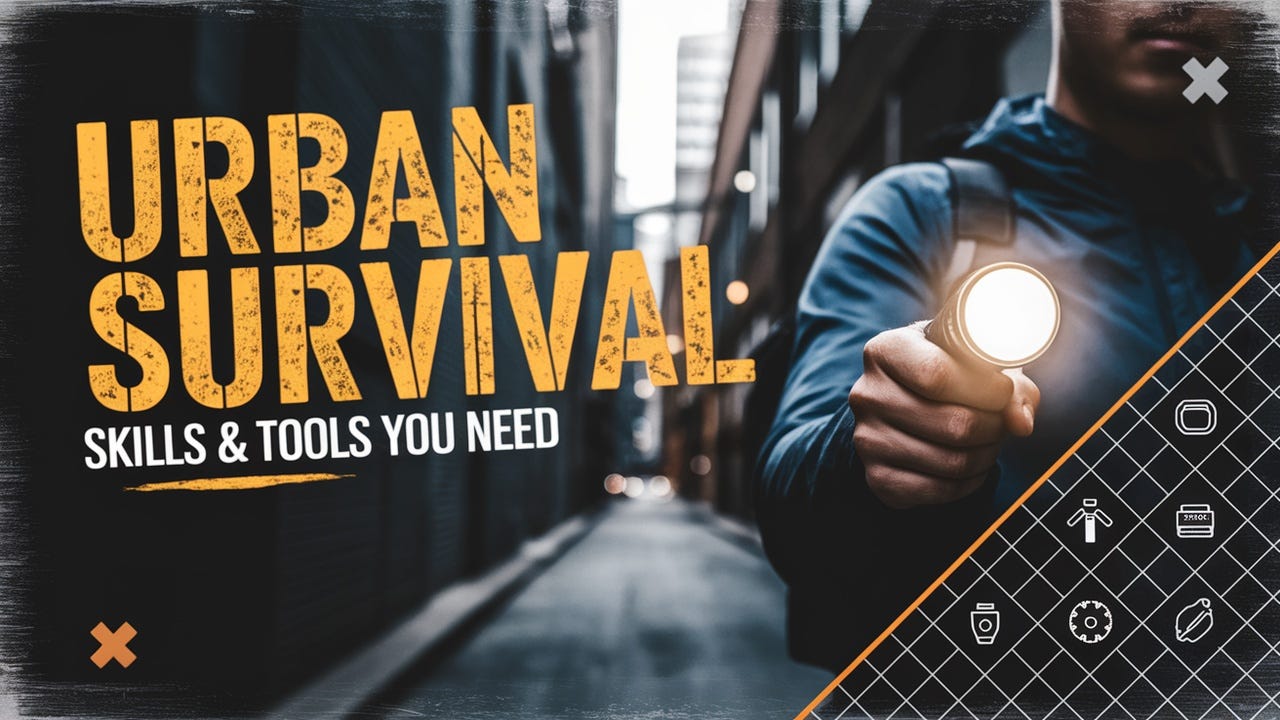Essential Skills & Tools for Urban Preparedness
Urban Survival for Christians
Cities are growing more crowded, faster, and more vulnerable. Statista reports that 82.66% of Americans live in urban areas, and with rising population density comes increased risk of crises—civil unrest, natural disasters like floods, or infrastructure failures. As Christians, we’re called to be wise stewards of our resources and protectors of our families (Proverbs 22:3), preparing not out of fear but out of faith in God’s guidance. This guide outlines practical skills and tools to help you stay ready in urban emergencies, reflecting both preparedness and compassion.
Keep reading below …
Situational Awareness: Eyes Open, Heart Anchored
In a crisis, seconds can change everything. Developing situational awareness—reading body language, understanding crowd dynamics, and scanning your surroundings - gives you a head start. Stay alert on public transit, in elevators, or walking through parking lots. Distractions like phones or earbuds can dull your senses, leaving you vulnerable.
Consider Colonel Jeff Cooper’s Color Codes to stay mentally prepared. As SAFETY4SEA notes, this system, originally for military use, helps maintain personal safety through mental readiness:
Condition White – Total Unawareness: Relaxed but unprepared, this is risky.
Condition Yellow – Relaxed Awareness: Calm yet observant, noting exits, people, and sounds.
Condition Orange – Focused Alertness: A potential threat narrows your focus for assessment.
Condition Red – Ready to Act: Responding to a confirmed threat with clarity.
Condition Black – Frozen in fear, unable to defend or retreat.
As Christians, awareness extends beyond self-preservation. Jesus calls us to be “wise as serpents and innocent as doves” (Matthew 10:16). Staying alert allows you to protect your family and extend help to others, reflecting God’s love even in tense moments.
Knowing Your Rights: Seeking Justice with Grace
Crises often bring injuries, sometimes due to human neglect or recklessness. ScienceDirect reports that crowd accidents have claimed thousands of lives globally, especially in dense urban areas. A tragic example, reported by CBS News, involved a 21-year-old driver in Chicago speeding at 131 mph, causing a fatal crash that killed Niketic and injured others.
If injured in a crisis, understanding your legal rights is part of preparedness. TorHoerman Law explains that a personal injury lawyer can help determine responsibility - whether it’s the city, a transit authority, or a third party. Pursuing justice should align with Christian values: seek accountability, but with a heart for forgiveness and restoration, trusting God to guide the process (Romans 12:19).
Accessing Clean Water: Trusting God’s Provision
Clean water seems guaranteed in cities, but disasters can disrupt supplies. Water mains may break, and stores often sell out of bottled water quickly. The NRDC notes that over 9 million U.S. households still rely on lead-contaminated service lines, making portable water filtration a critical tool.
A compact water purifier or filter bottle is a wise investment, ensuring you can provide for your family and share with neighbors in need. As Christians, we’re called to care for others, like the Good Samaritan (Luke 10:25-37). Preparing to secure and share clean water reflects this call, trusting God to multiply our efforts.
Self-Defense and Physical Safety: Protecting with Peace
Urban crises can turn safe streets dangerous. During large-scale emergencies—riots, blackouts, or floods - violent crimes like looting or assaults often spike. Physical safety begins with mental readiness. Panic clouds judgment, but staying calm, as Philippians 4:6-7 encourages, helps you act with clarity.
Train to notice exits, suspicious behavior, and crowd movements. Basic self-defense techniques, like breaking a hold or creating distance, can help you escape danger. The goal is protection, not aggression - defending your loved ones while seeking peace. Christian preparedness means balancing the duty to protect (1 Timothy 5:8) with the call to love our enemies (Matthew 5:44). Prayer and practice can prepare your heart and hands for such moments.
Treating Injuries: Being a Healing Presence
In a disaster, medical help may be delayed. The U.S. Department of Transportation emphasizes the “golden hour”—the critical first 60 minutes after a traumatic injury—where prompt care can save lives. EMS delays are common in dense cities, so learning to treat injuries like bleeding, fractures, burns, or breathing issues is essential.
Build a compact first-aid kit with:
Trauma dressings
Tourniquet
Antiseptic wipes
Gloves
Splinting materials
CPR mask
As Christians, treating injuries is a chance to be Christ’s hands and feet, offering care to those in pain (Matthew 25:40). Training in first aid equips you to serve others, reflecting God’s compassion in a crisis.
FAQs
What skills are needed for emergency management?
Strong leadership, communication, critical thinking, and decision-making are key. Coordinating teams, analyzing risks, and managing resources under pressure are vital, grounded in a faith that seeks wisdom (James 1:5).
What is DRP?
A Disaster Recovery Plan (DRP) outlines how to restore operations after a crisis. It includes tools, procedures, and roles to minimize disruption, reflecting good stewardship of what God entrusts to us.
What is the primary aim of early warning systems?
Early warning systems detect and forecast hazards, enabling timely action to reduce harm. They align with the biblical call to be watchful and prepared (Luke 21:36).
Conclusion: Prepared in Faith, Ready to Serve
Preparedness isn’t about fear—it’s about peace of mind rooted in faith. Practicing escape routes, refreshing first-aid skills, and involving your family in drills build confidence. Disasters may come without warning, but preparation, guided by God’s wisdom, gives you strength.
Urban readiness means staying calm in the storm, trusting God’s provision, and being ready to help others. Make your plan today. Stay safe, stay smart, and stay faithful.
~ Chris



